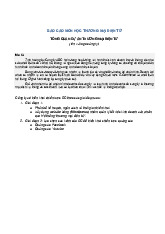



Preview text:
2. Cross-Border Selling
2.1. The definition of Cross-border Selling and its significance in E-commerce.
Cross-border selling refers to the process of purchasing and selling products or
services between companies based in different nations. This transactional activity is
commonly facilitated online through e-commerce websites and various digital
platforms. In the realm of e-commerce, cross-border selling holds significant
importance as it serves to expand market horizons, create new business opportunities,
and enhance global customer outreach.
Participating in cross-border selling within the domain of e-commerce offers several
advantages. These include the potential for increased sales, a more defined competitive
position, and the opportunity to cater to the diverse cultural needs of international
markets. However, it is essential to acknowledge that engaging in cross-border e-
commerce also presents numerous challenges. Effective management is crucial to
navigating potential risks, especially those pertaining to legal issues and limitations
inherent in conducting business across international borders. Careful consideration and
strategic planning are necessary to ensure successful and sustainable cross-border e- commerce operations.
2.2. Assessment of legal challenges and limitations when conducting Cross-Border business. 2.2.A. Challenges
Although the significance of legal difficulties varies based on particular situations
and sectors, we have identified and discussed three major challenges that we believe to be the most crucial.
2.2.A.1. International Trade Regulations:
To ensure that cross-border transactions go successfully, it is crucial that you abide
by the laws governing international trade as well as customs regulations. specific
products may not be allowed at specific locations, and delays and fines may result from breaking these regulations.
2.2.A.2. Data Privacy and Security:
Following various data protection and privacy rules is essential in this era of growing
online transactions. Mishandling customer data can lead to severe legal consequences
and significantly damage the business's reputation. An key part of conducting business
internationally is protecting private information and making sure that security protocols are strong.
2.2.A.3. Contractual Agreements:
Managing connections with international partners and clients requires drafting and
enforcing contracts that are legal and enforceable in multiple countries. When
problems emerge in the course of business partnerships, having contracts that are both
legally sound and clear is essential to averting disputes and offering a formal
framework for their settlement. 2.2.B. Limitations
Engaging in cross-border business encounters significant challenges due to complex
laws and regulations. We have identified and distilled four key limitations that stand out as particularly critical.
2.2.B.1. Legal and Regulatory Differences:
Navigating diverse legal systems and regulations across countries poses challenges in
managing contracts, resolving disputes, and ensuring compliance. Dealing with the
intricacies of trade regulations, tax policies, and operational laws in each location
requires a thorough understanding of the legal landscape.
2.2.B.2. Cultural and Communication Barriers:
Disparities in language and business practices can lead to misunderstandings,
impacting negotiations and relationships. Factors such as differences in time zones,
language nuances, and diverse communication styles make collaboration and decision- making more intricate.
2.2.B.3. Logistical Complexities:
Managing international supply chains involves addressing issues like customs
procedures, transportation logistics, and potential delays, all of which can impact
timely deliveries. The efficiency of logistical operations is influenced by the movement
of goods and the utilization of technology..
2.2.B.4. Currency and Financial Risks:
Foreign consumers in cross-border export e-commerce websites usually pay in local
currencies (such as U.S. dollars, Yen, Euros, etc.) and the following should be
considered when sellers make payment settlements: The relevant exchange rates for
converting foreign currencies into VND and the issues involved in cross-border
financial compliance. Adhering to varying laws related to banking and taxes adds
complexity to financial management, making the handling of money more challenging.
2.3. The effective manner in which Amazon seamlessly integrates cross-border sales into its system.
Amazon has made significant developments in cross-border selling. As a leader in
the cross-border export industry, Amazon has a strong global logistics and fulfillment
network. They have upgraded their cross-border export e-commerce platform, which
has several advantages compared to traditional foreign trade transactions.
Additionally, Amazon provides various services to support sellers in areas such as
taxation, brand building, marketing, and payment collection. Sellers can also benefit
from real-time monitoring of their product sales and transparent transaction
information, empowering them to make quick adjustments to their strategies and production plans.
Furthermore, Amazon's cross-border export e-commerce website offers features like
consumer reviews, which help sellers understand customer preferences and improve
their product design accordingly. Sellers can also take advantage of language-specific
product translation services provided by Amazon to simplify the transaction process.
Overall, Amazon's logistics network and innovative tools play a crucial role in
facilitating global sales in the cross-border export industry, providing sellers with the
necessary infrastructure and support to reach customers worldwide.
2.3.1. The development of Amazon in implementing cross-border sales from 2021-2022.
80% is the number of Vietnamese selling partners on Amazon has increased. 1
Nearly 10 million products of Vietnamese businesses were sold to Amazon
customers all over the world, increased more than 35% year-over-year.1
The number of Vietnamese selling partners that surpassed $500,000 in sales grew by 60%. 1
The number of Vietnamese Selling Partners that took advantage of Fulfillment
by Amazon increased more than 90% and their FBA sales grew more than 50%.1 Source:
1 . Báo cáo hoạt động của Amazon 2022



